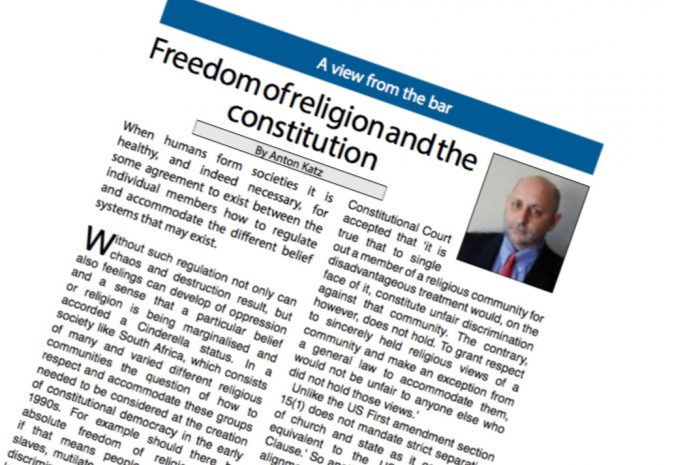A view from the bar
By Anton Katz
When humans form societies it is healthy, and indeed necessary, for some agreement to exist between the individual members how to regulate and accommodate the different belief systems that may exist.
Without such regulation not only can chaos and destruction result, but also feelings can develop of oppression and a sense that a particular belief or religion is being marginalised and accorded a Cinderella status. In a society like South Africa, which consists of many and varied different religious communities the question of how to respect and accommodate these groups needed to be considered at the creation of constitutional democracy in the early 1990s.
For example should there be absolute freedom of religion, even if that means people could possess slaves, mutilate animals during worship, discriminate against women or gays and lesbians or torture all those who deemed non-believers? On the other hand, if broader society sets minimum standards of behaviour for all persons irrespective of their religious beliefs how far may that encroachment go? If the larger community dictates that no torture — even if required by some religion — can occur that may be reasonable, but if the society rules that there can be no discrimination at all on the basis of gender will that be ok? Section 15 (1) of the Constitution deals with the right to freedom of religion, belief and opinion.
It states: ‘Everyone has the right to freedom of conscience, religion, thought belief and opinion.’ What section 15(1) protects is the right to choose, observe, and express one’s religion, beliefs or opinions, free from direct or indirect coercion. Compulsion of religious observance, for example through forced synagogue or church attendance would fall foul of the Constitution and be invalid. Interesting situations arise when a law
or governmental policy, which may appear neutral from a religious perspective, is perceived by some religious communities to restrict or prohibit their right to freedom of a religious or other group or individual. Criminalising the use of cannabis or regulating uniforms or conduct at government schools are obvious examples. The courts in these contexts have developed the doctrine of reasonable accommodation.
This requires, for example, schools and the criminal justice system to accommodate and exempt sincerely held religious beliefs and practices. The Constitutional Court ruled that a school learner may be allowed to wear, as part of her cultural (Hindi) heritage a nose stud, even if it violates the school uniform code. But the outright ban on corporal punishment is an acceptable restriction on the practice of Christian doctrine. In making these decisions the Constitutional Court accepted that ‘it is true that to single out a member of a religious community for disadvantageous treatment would, on the face of it, constitute unfair discrimination against that community.
The contrary, however, does not hold. To grant respect to sincerely held religious views of a community and make an exception from a general law to accommodate them, would not be unfair to anyone else who did not hold those views.’ Unlike the US First amendment section 15(1) does not mandate strict separation of church and state as it contains no equivalent to the US ‘Establishment Clause.’ So another type of issue arises: alignment by the state with a particular religion. A classic example is the adoption of public holidays on particular religious holidays.
In South Africa Christmas is a public holiday, but Yom Kippur is not. Is this a violation of section 15(1)’s promise of the right to freedom of religion? In a case involving a challenge to a restriction on the sale of alcohol on Sundays the Constitutional Court ruled that the Sunday restriction did not violate the right to freedom of religion only because Sundays had taken on a secular character, and because genuine non-religious objectives — specifically, curbing alcohol consumption — underpinned the prohibition. But the Court stated ‘explicit endorsement of one religion over others would not be permitted in our constitutional order.’
For the state, which includes all departments, all provinces, all municipalities and parastatals such as SAA, Eskom, the SABC, to align with a particular religion, in the absence of a neutral justification, impermissibly coerces adherents of other faiths, as well as non-believers. In the coming years issues are likely to arise concerning the protection of the right to freedom of religion and belief. In the coming months a challenge in the Western Cape High Court by the Women’s Legal Centre focuses on the status of Muslim marriages in relation to rights of women not to be unfairly discriminated against.
The issues are wide ranging and many different parties and amici curiae will be participating in the arguments. Courts are best placed to make the most appropriate orders if detailed evidence and arguments are submitted. Without the required factual and legal detail danger exists that courts may make orders and rulings with far-reaching consequences for many individuals and communities, without proper consideration.
This needs to be avoided if at all possible. Vigilance as to the issues affecting religious communities is paramount.











